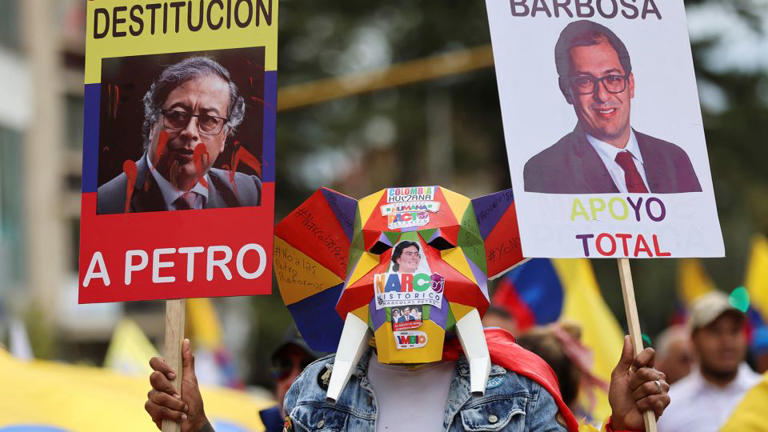Editor’s Note: Kristina Foltz (@kristinafoltz1) is a writer on Colombian affairs and Rotary Ambassador scholar, based in Bogotá. The views expressed in this commentary are her own.
A few years ago, the international district where I live was a creative hub of harmonious chaos. Music throbbed from every street corner. The Colombian capital’s sophistication was evident from its magisterial libraries to its abundant museums. The sparkling streets were regularly washed clean.
Read More:- If You Invested $1,000 In Coca-Cola Stock When Warren Buffett Did, Here’s How Much You’d Have Today
Today, graffiti dims the beauty of Bogota’s colonial baroque architecture. Young people congregate on trash-covered streets. Signs held by protesters express indignation and determination to fight for Colombia’s democracy, one of the longest-standing in Latin America. Increasing violence conjures memories of Colombia’s conflict-ridden past.
A little over one year after Colombia elected its first leftist president — Gustavo Petro — the former rebel and longtime senator’s pledge to transform one of Latin America’s most unequal countries is failing. And I believe the president’s false populist promises pose a clear danger to Colombia’s democracy.
I’m not the only one who fears the direction Colombia is headed in. Last week, thousands of Colombians in multiple cities marched for Petro’s resignation or judicial action on his alleged crimes and scandals. It was the second “March of the Majority” demonstration this summer, adding to the growing list of anti-Petro rallies this year.
Read More:- Stock market today: Asian stocks mixed as traders await Fed conference for interest rate update
Among the many concerns of young protesters I spoke to, are increasing violence and the high-profile political scandal of Petro’s eldest son — Nicolas Petro — receiving from a convicted drug trafficker large sums of money. Among several sources of illicit money, some went to Nicolas’ pockets and the rest to the political campaign, according to Nicolas’ testimony.
(The president himself has denied awareness of illegal activities.)
Before Petro, Colombia had been governed for decades by liberal and conservative parties forming part of the broader Colombian political right. Despite recent years of economic and social progress, inequality in the Andean country has inspired guerrilla and narco-backed leftist groups to condone violence as a means to what they see as a greater end.
Petro’s campaign messages about supporting poor and marginalized populations held wide appeal for many young Colombians and first-time voters, in the hope he was a step towards change. The reality now is bleak. Petro’s reforms stalled in Congress, and his disapproval rating rose from 20% to 61% in one year, (according to a recent poll conducted in five major cities), a presidency continually burdened with mass street demonstrations. Petro has responded by organizing his own demonstrations, insisting the Colombian people are actually in favor of him.
Read More:- A New Stock Is About to Join the S&P 500. Does History Show That Buying It Now Could Pay Off?

But what about young Colombians, who, like me, are worried about the direction Petro is taking the country?
Ivan Oros, 28, voted for Petro in 2022 because “initially I liked the idea of change,” he told me. One year later, he’s less certain the president has lived up to his campaign promises.
From his hometown of La Primavera, Ivan showed me over WhatsApp video the densely forested landscape of his region, Vichada, on the eastern border with Venezuela.
Read More:- Personal-loan rates are half credit-card APRs. Is now the time to consolidate?
An area known for intense narco-trafficking, the Revolutionary Armed Forces of Colombia (FARC) rebels historically controlled most of the economy, border and jungles there. Until recent years — when a period of relative peace and stability resulted from hard-lined presidents who refused to negotiate with criminals — the rule of law was mere fantasy. Ivan says violence is now resurfacing, despite Petro’s promise of “Total Peace” between the Colombian armed forces and the narco-backed guerrillas.
Ivan’s father was a farmer and his mother works “any jobs she can find.” He knew from a young age that he wanted to attend university. He had to study hard to earn a scholarship — under a program created previously during the Juan Manuel Santos administration — to the University of Pamplona, a public university of 30,000 students, 34 hours by bus from Ivan’s home. He studies Social Communications.
Ivan says he was drawn to Petro because, “he always had a message about generating free quality education for young people. I believe if you educate youth, you educate a country, and then you can do a lot of good things.”
When I mentioned that Colombia’s education was already free before Petro, he admitted: “It’s true, in the past two years, former president Ivan Duque’s ‘Matricula Cero’ program began.” Even though such programs already existed, Ivan hoped the new president would somehow encourage young people from rural areas like his own to take advantage of them.
Read More:- Here’s What Happens When You Retire With Just $100,000
Last month Petro ratified and took credit for Duque’s 2021 “Matricula Cero” program, which, until 2022, provided unrestricted free education to all lower and middle class Colombians.
But a spokesperson for the Colombian Organization of Students told the news outlet El Tiempo that the new version of the law will actually increase barriers to access, limiting it to students registered with SISBEN, a classification system that requires registration prior to receiving social benefits.
Now Ivan says he’s undecided about Petro after the money laundering scandal involving the president’s son Nicolas — which he called “extremely bad.”
Back in Bogotá, I met Ariel Ricardo Armel, 29, on the patio of a Juan Valdez coffee shop. He’s concerned Petro’s reforms “would turn Colombia into Venezuela.” Ariel believes Petro is following an autocratic playbook similar to that of Hugo Chavez. The late Venezuelan president took power in 1998, made promises to the poor, nationalized the health and pension programs and changed the constitution to expand presidential powers. His successor, President Nicolas Maduro, continued Chavismo policies that have destroyed the Venezuelan economy.
“Petro’s health reform would destroy years of progress,” Ariel told me. The proposed reform would nationalize Colombia’s health care system, dismantling the existing public/private system and placing it under presidential control. Colombia’s healthcare system is already among the best and most equitable in the world. The WHO rated it 22nd out of 191 developed countries. (For comparison, the US was ranked 39th.)
Read More:- Trump’s expected Georgia surrender and debate no-show shatter campaign conventionality
In June, Ariel and four friends created the “March of the Majority” group over WhatsApp. I was included in the group and witnessed as it exploded into a huge movement within a few weeks, over WhatsApp, Twitter, Instagram and eventually the news outlets. On June 19th, according to police estimates, 92,000 Colombians took to the streets in 20 cities and eight foreign cities to march against the president’s reforms. (Ariel and many others believe the number is closer to 150,000; Plaza Bolivar, which easily holds 45,000, was packed.)
To Ariel, the signs that Petro is an aspiring dictator are clear. “The theme of press intimidation is very strong,” he said, pointing to reports linking Petro’s campaign to “bots on outlets like Twitter, to threaten and delegitimize the Colombian press which Petro claims are owned by corrupt elites and narcotraffickers.” (Petro’s campaign manager has denied links to the fake accounts.)
Armando Duarte Galan, one of the five original members of the March for the Majority, put it this way to me: “I think the narrative should shift around Petro’s governability and the legitimacy of his presidency. The charges that should be levied against this president are quite serious. People want accountability.”
Read More:- How the GOP is becoming ‘the party of Trump toadies’
If a country’s democracy depends on its people, the heartbeat of Colombia’s is still pulsing vigorously. Opposition in Congress and the passionate voices of Colombia’s youth indicate their hope in a better future. Hopefully to prevail before it’s too late.









































